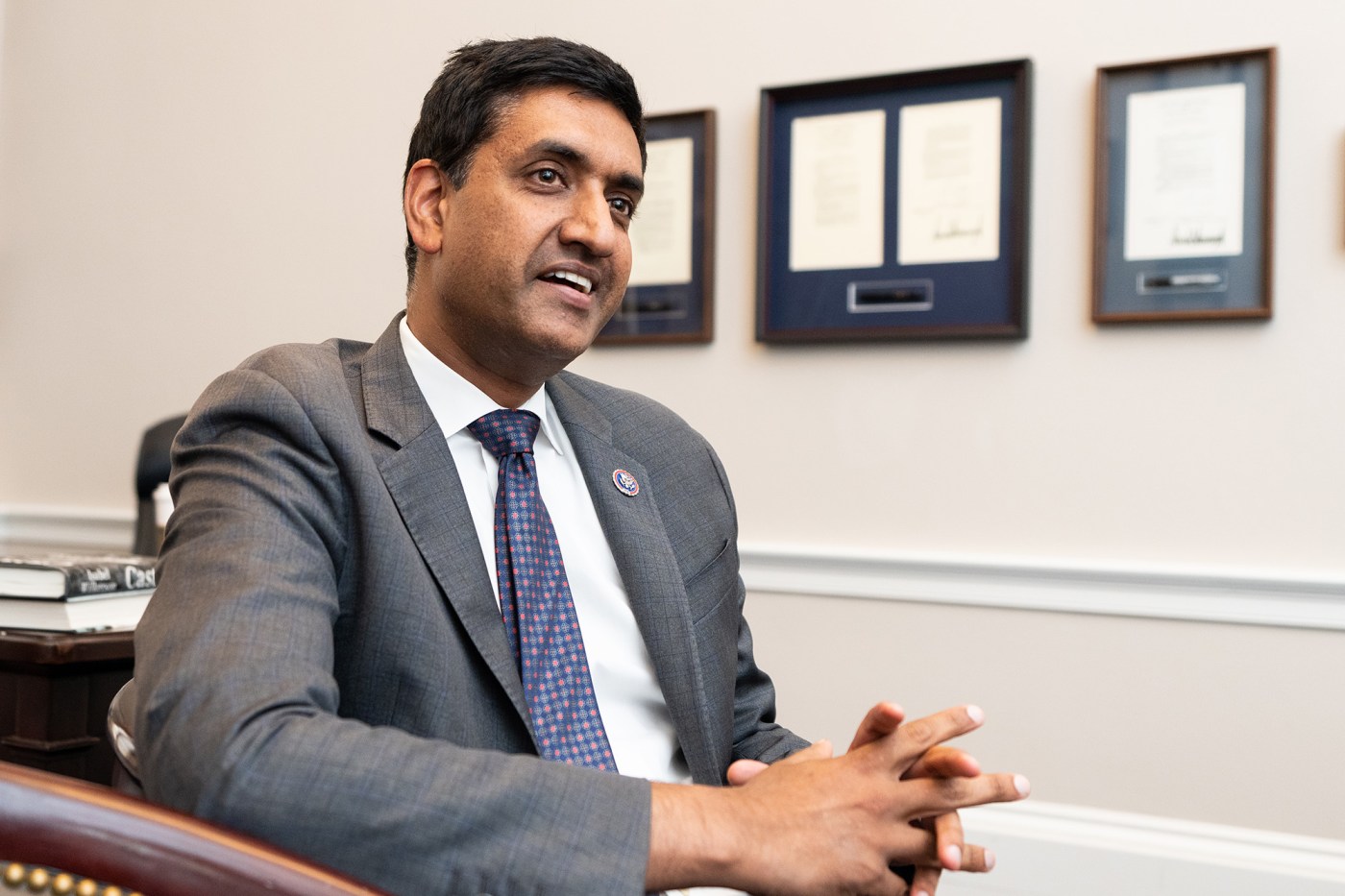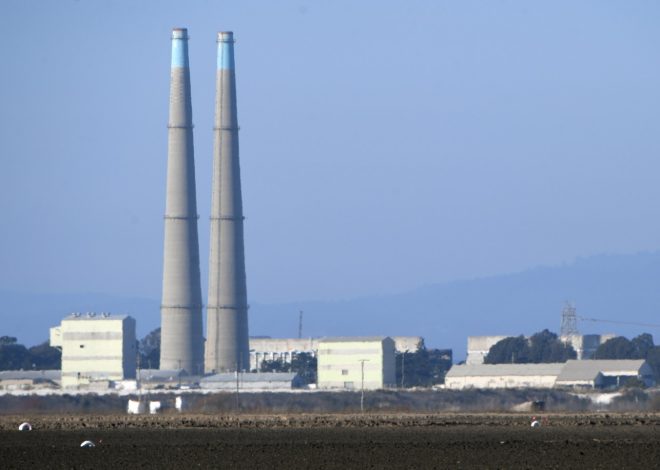
Goldberg: Can the Democrats be the party of the future again?
Until recently, there was nothing dissonant about the fact that the heart of Silicon Valley is represented in the House by one of the most progressive members of Congress, Ro Khanna, a close ally of Bernie Sanders. A veteran of Barack Obama’s Commerce Department, Khanna first ran for office, as Politico put it, with the “overwhelming support of the deep-pocketed tech community’s CEOs and venture capitalists,” and for years, he maintained friendly relationships with men like Elon Musk, who blurbed his first book.
He was elected in 2016, at the tail end of a period when technological progress and social progress still seemed intertwined. Republicans distrusted Big Tech almost as much as they did Hollywood and the media, while Democrats positioned themselves as the party of the future.
That period has now come to an end. Many of the most powerful people in Silicon Valley have swung rightward, donating to Donald Trump and in some cases making their technologies more congenial to Republicans.
Musk’s X has become a font of reactionary propaganda; as apocalyptic fires ravage Los Angeles, its algorithm is filling my feed with posts claiming, falsely, that the mayor slashed the Fire Department’s budget, and insisting that conditions for the inferno were created not by climate change but by diversity initiatives.
Meta’s Mark Zuckerberg’s recent announced that Facebook would eliminate outside fact-checking and allow for more racist, anti-LGBTQ+ and anti-immigrant rhetoric on the platform, arguing that the 2024 election feels “like a cultural tipping point toward once again prioritizing speech.” That’s an odd thing to say about the elevation of a man who is constantly trying to sue his critics into oblivion, but one that makes sense if you understand free speech primarily as freedom from liberal scolding.
Meanwhile, the cryptocurrency industry, having used its unfathomable resources to help knock out of Congress economic populists like Sen. Sherrod Brown of Ohio, is poised to enjoy a deregulatory bonanza under Trump, setting the stage for an orgy of dangerous financial speculation. Artificial intelligence is being employed to deny health insurance claims, smother the internet with slop and eliminate jobs.
A coherent story
Most Silicon Valley voters still seem to lean left — Khanna won reelection in November by more than 35 points — but the tech industry is increasingly a force for unaccountable oligarchy. So I was curious to speak to Khanna about how he’s navigating the ideological transformation of a milieu that was once an important part of his base.
In some ways, he’s struggled. Last month, Khanna expressed eagerness to work with the Department of Government Efficiency, the advisory panel being run by Musk and Vivek Ramaswamy. As he saw it, he was trying to propose an alternative to slash-and-burn austerity while starting a conversation about wasteful Pentagon spending. But he infuriated many left-leaning voters by seeming to treat Musk and Ramaswamy as if they were acting in good faith. And he certainly didn’t win any goodwill from Musk, who posted that it was “game over” for Khanna after he voted in early January against the Laken Riley Act, a bill to expand migrant detention.
Still, Khanna is particularly thoughtful about the relationship between progressive politics and technological innovation. And while he thinks some of the reasons for the right-wing turn among tech bigwigs are self-evident — billionaires want lower taxes and less regulation — he also thinks it should provoke Democratic introspection.
“The government hasn’t often delivered the things we said it should deliver,” said Khanna. In the CHIPS Act, which he co-wrote, “money was allocated for rural broadband, but we don’t have much evidence that it’s actually been dispersed and working.” Joe Biden’s Inflation Reduction Act contained significant investments in American industry, but many promised factories still haven’t been built.
The administration, he said, should have chosen a few cities as demonstration projects: “Pick a community like Johnstown, Pennsylvania; or Galesburg, Illinois; or Milwaukee, Wisconsin, and say, ‘Here’s what it was, here’s a year later what we have done in this community, and here’s how it’s turned around.’” Democrats, he suggests, lost the ability to tell a coherent story about how they’re making people’s lives better.
A strong alternative
Khanna isn’t alone, of course, in arguing that progressives have squandered public trust by failing to govern effectively; my New York Times colleague Ezra Klein has repeatedly leveled similar critiques. But Khanna is also making a broader argument, which is that Democrats have failed to conjure up a vision of the future that’s either reassuring or exciting.
“This is, I think, where we have such a challenge to present the counter to the Trump-Musk-Vance presidency, which is they’re trying to take the patina of the future and connect it with deregulation and Texas,” he said, invoking the location of Musk’s new headquarters, a state that combines social conservatism with laissez-faire economics.
Khanna continued, “What we have to do is say, ‘We get the future, we understand technology, and we have a far better vision for how technology is going to help your family, your community, and how we’re going to regulate technology.’”
Related Articles
Michelle Obama let America know her low opinion of Trump at the DNC
Many Democrats don’t think they’ll see a woman become president, poll finds
States are preparing to help or thwart Trump’s second-term plans
Activists file class-action lawsuit over two Bay Area congressmen’s Israeli aid vote
Photos: A nation says a final goodbye to President Jimmy Carter
The right has a clear idea of the world it wants to create, however revanchist and dystopian it might seem to its opponents. There is no similarly motivating spirit on the shellshocked left, at least outside of Latin America. Incremental change to a hated status quo is clearly insufficient, but progressives haven’t laid out a picture of comprehensive transformation that seems either workable or inspiring to most people.
Khanna sees an opportunity in the clustering of tech oligarchs around Trump. There are deep fissures in Trump’s coalition between men like Steve Bannon, who favor increased economic support for the working class, and those like Musk, who want corporations and capital to be unfettered.
If the incoming president lets himself be influenced by the Silicon Valley libertarians, said Khanna, “I think he leaves us a huge opening to say, ‘Look, this, this is the ideology that’s really failed the working and middle class, and we’re going to have a more working-class, middle-class economic approach.’”
At that point, the future may finally start to look less foreboding.
Michelle Goldberg is a New York Times columnist.


